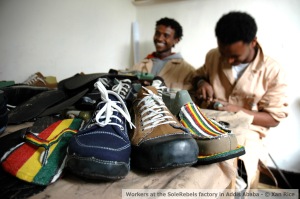The Good & The Bad of Foreign Aid
Refreshing and inspiring companies are hard to come by, especially those that actively seek to address the imbalance of wealth and opportunity that negatively affects so many people in so many places in our world today. I was so impressed when I came across a company called soleRebels. They sell shoes made by workers in Ethiopia and pays them 4 times the legal minimum wage, 3 times the industry average for similar work, and is the first WFTO/IFAT FAIR TRADE certified footwear company in the world. soleRebels also upcycles discarded materials, like old tires, to make their products!
There are so many companies who mean well by giving away free products (or shoes in particular) to people in need, but do not realize that, instead of really helping they are exacerbating the root cause. The underlying problem is poverty. Giving out free shoes, for example, can out-compete local businesses and can potentially hurt the community you’re trying to help. Also, it likely costs more to ship and transport the shoes, than it would to simply commission their manufacture locally – which would in turn create a stimulus to their local economy.
Giving away free things to low-income communities is not always the best option because you don’t want the people of these communities to rely on short-term interventions. We need to find ways to devise systems that will be around longer than the organization or initiative will. So, if we drop a bunch of free shoes in a low-income community, it can take away their incentive to shop at local businesses which in turn will suffer, thereby creating more hardship in those communities. Why buy a shirt locally anymore when you can get a free one? Why get your shirt repaired when you can just get a free one? Giving away stuff does not help alleviate poverty. In fact it, more likely than not, will make a bad situation much worse over time.
We should help create JOBS in those communities, so that local people can sustain their livelihoods and feel fulfilled every day. We should support LOCAL businesses and shop ETHICALLY, so that we are not contributing to increasing rates of unemployment and discarding useful products into landfills.
While it is important to have companies like this one who seek to define themselves according to a higher morality and an elevated ethical standard, it is also important to do it in a way that will permanently raise the standard of living by improving the local economy through job creation and the concomitant sense of empowerment that generates in the members of that community. Thus a more thoughtful approach is essential to help build momentum and generate positive cycles for conscious consumerism.



Thanks for this. People need to consider where their clothes and good come from.
Thought, it is so hard to shop ‘ethnically’ due to the complexity of things like supply chains; this is when you buy a dress from a company that pays it’s workers decent wages, that company purchased it’s fabric from a factory that gives good conditions to its workers and it is all good up to the point when you discover that the cotton was picked by child labour.
LikeLike
True, but hence the required vigilance in making sure that these companies are working ethically before you purchase. Requires a lot of initiative and can be time consuming but then again, a lot of effort was put into how we got here in the first place. Great article!
LikeLiked by 1 person
Thank you so much for your comment! You are so right.
LikeLiked by 1 person